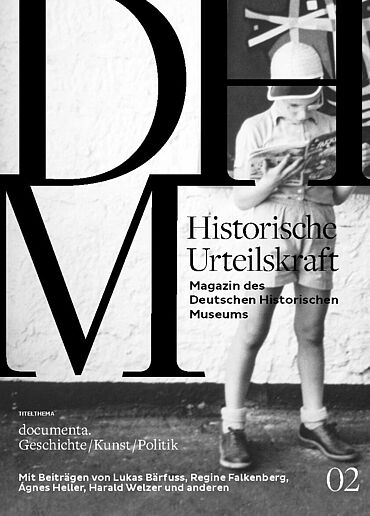documenta.
History / Art / Politics
Symposium, October 15, 2019
The aesthetic-political history of the Federal Republic is notably reflected in the documenta. When it was founded in 1955, the event was seen as an artistic initiative for a re-entry into the world of the Modern Age, as a ‘new beginning’ after a phase of extreme political-ideological instrumentalisation.
Since that time it has acted as a common thread running through the history of the Federal Republic and has repeatedly proved itself as a place where central aspects of post-war German history, the traces of National Socialism, the bloc building of the Cold War and the self-understanding of West German society are mirrored.
At the symposium documenta. History / Art / Politics renowned art historians and curators, artists and historians will take the example of the exhibition to discuss the complex relationship between history, art and politics, including i.a. sculptor E. R. Nele Bode (Frankfurt/Main), art historian Wolfgang Brauneis (Cologne), archive curator Mela Dávila (Hamburg), director and curator Sabine Eckmann (St. Louis), artist Maria Eichhorn (Berlin), historian Norbert Frei (Jena), curator Julia Friedrich (Cologne), historian and curator Bernhard Fulda (Cambridge), art historian and curator Eckhart Gillen (Berlin), documentary film maker and artist Amar Kanwar (New Delhi), art historian and curator Lars Bang Larsen (Copenhagen), curator and art historian Pietro Rigolo (Los Angeles), art critic and historian of science Julia Voss (Luneburg), literary scholar Liliane Weissberg (Philadelphia) and historian and curator Dorothee Wierling (Hamburg).
This is the second symposium in our series “Historical Judgement”. It is taking place in connection with the exhibition on the history of the documenta, planned for 2021, which will be curated by Lars Bang Larsen and Dorothee Wierling.
-
![Cover of the 2nd “Historische Urteilskraft” magazine.]()
Publication
Historical Judgement 02. Magazine of the Deutsches Historisches Museum
The articles in the second issue of the magazine open new perspectives on the “documenta” and the postwar period, contradicting the claim of an aesthetic new start after 1945.
PROGRAMM
as of 04/09/2019
8.30-9.30
Registration
9.30-10.30
Welcome
Prof. Dr. Raphael Gross, Deutsches Historisches Museum, Berlin
Keynote
Moderation
Prof. Dr. Liliane Weissberg, University of Pennsylvania, Philadelphia
Embracing doubt
Amar Kanwar, Artist, filmmaker, New Delhi
Discussion
10.30-11.00
Eyewitness talk
Prof. Dr. Dorothee Wierling, ret., Research Centre for Contemporary History in Hamburg
E. R. Nele Bode, Sculptor, Frankfurt a. M.
11.00-11.45
Introductory speech
Moderation
Mela Dávila, Archive curator, Hamburg
Modernity is the best medicine: How documenta helped the Germans to pass off the wounds they had inflicted upon others as their own. And to heal them at the same time.
Dr. Julia Friedrich, Museum Ludwig, Köln
Discussion
11.45-13.00
Lunch break
13.00-14.30
Panel I
The documenta and National Socialism
Moderation
Prof. Dr. Julia Voss, Leuphana Universität Lüneburg
documenta I – Comeback through canonization?
Dr. Bernhard Fulda, University of Cambridge
The “Divinely Gifted” in the FRG. Artists of National Socialism in the 1950s and 1960s
Wolfgang Brauneis, Art historian, Köln
Discussion
14.30-15.00
Artist talk
Dr. Lars Bang Larsen, Curator, Kopenhagen
Maria Eichhorn, Artist, Berlin
15.00-15.30
Break
15.30-18.00
Panel II
The documenta and the Cold War
Moderation
Prof. Dr. Norbert Frei, Friedrich-Schiller-Universität Jena
In the Shadow of the Cold War: Abstract Art in France, Germany and the U.S., 1945-1959
Dr. Sabine Eckmann, Washington University, St. Louis
„“Immune to the siren calls of the ‘mass happiness dogmas’ (Werner Haftmann): documenta 1 + 2 as rectification of the past and bulwark against the East”
Dr. Eckhart J. Gillen, Art historian, curator, Berlin
Besser sehen durch documenta? The planning of documenta 5, and the attempt to glance beyond the Iron Curtain.
Dr. Pietro Rigolo, Getty Research Institute, Los Angeles
Discussion
Venue
Deutsches Historisches Museum
Zeughaushof
Unter den Linden 2
10117 Berlin
Conference languages
German and English (with simultaneous translation)
Contact
Vera von Lehsten
tagungsbuero@dhm.de
Tel. +49 (0)30 20304-392
Lecture series on Historical Judgement
The Deutsches Historisches Museum sees itself as a place where historical judgement can be reinforced. Such judgement is formed in the discussion of multifarious, often conflicting opinions and is indispensable when we reflect on events of the present in the light of the past, when we remember past happenings or want to research them. It requires the ability to draw abstract conclusions about one’s own situation and to recognise that historical events can be viewed from different perspectives. Only thus is it possible to examine one’s own judgement critically, to evaluate it comparatively and to fit it thoughtfully into the larger picture.
With the eponymous event series we want to examine the term “Historical Judgement” in the coming years on the basis of central topics of German history and their reference to the present, and thus to define it for the DHM: the aim is to create a consciously open and independent forum in the sense of an enlightened impulse, with which the Deutsches Historisches Museum can establish itself as a venue for deliberation on principal, overarching philosophical-ethical, historical and museological questions.
It is not about the attempt to reach a consensus, but rather by delving into controversies to advance the formation and further development of the public discourse and to reach an understanding about the multi-perspectivity, rather than linearity, of history in order to be able to call it into question once again in the light of new facts and events.
Last year in the first symposium under the title “The Stone Cross from Cape Cross – Colonial Objects and Historical Justice” we were the first museum to discuss in public and open-endedly with noted jurists and philosophers, curators and historians about how to deal with a controversial colonial object in our Permanent Exhibition. On 16 May 2019 the Board of the Deutsches Historisches Museum unanimously approved the decision then taken by the President, Prof. Dr. Raphael Gross, to return the stone pillar of Cape Cross to the Namibian state.
The lecture series of the Deutsches Historisches Museum "Historical Judgement" is supported by Christiane and Nicolaus Weickart.
